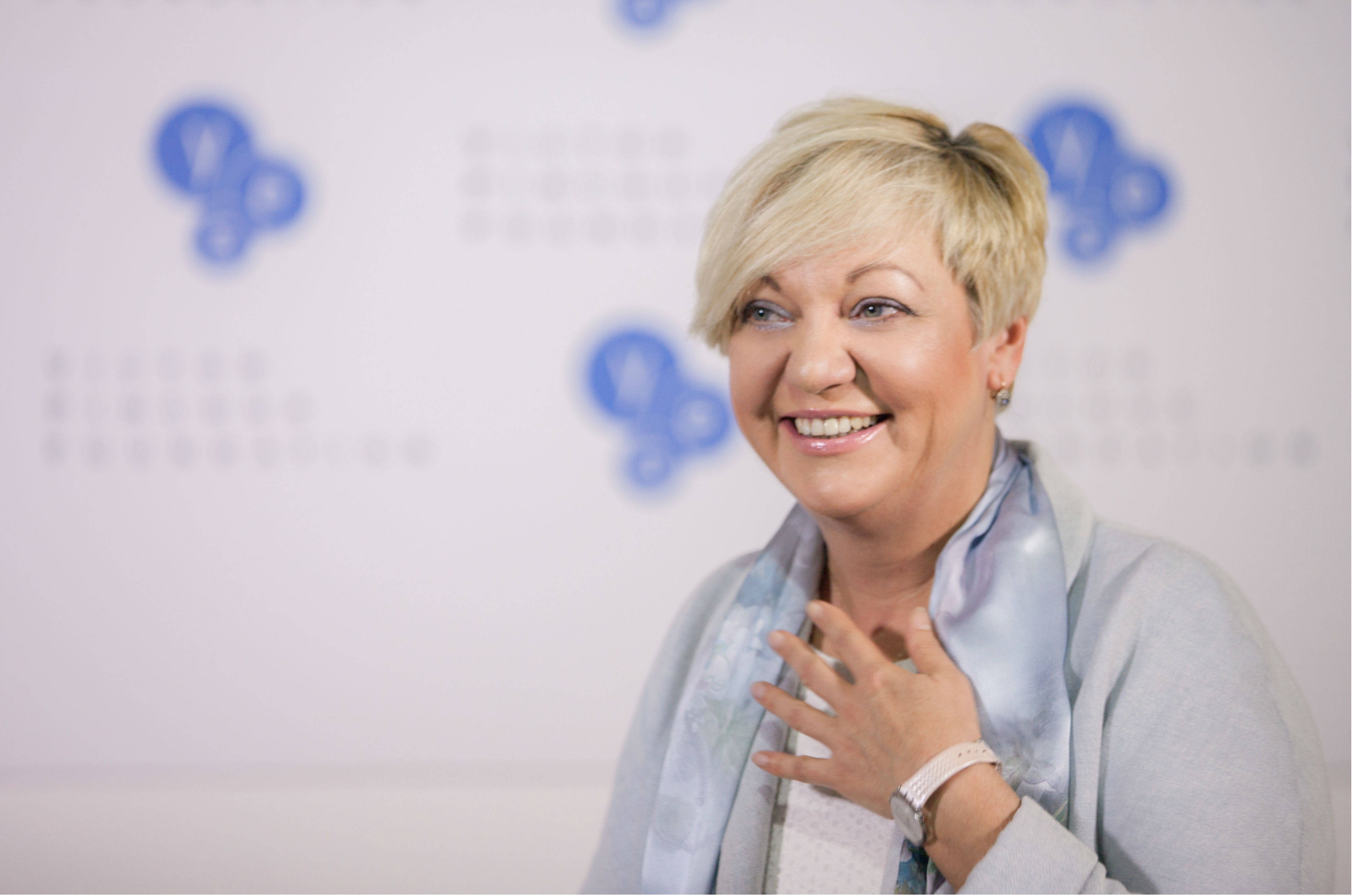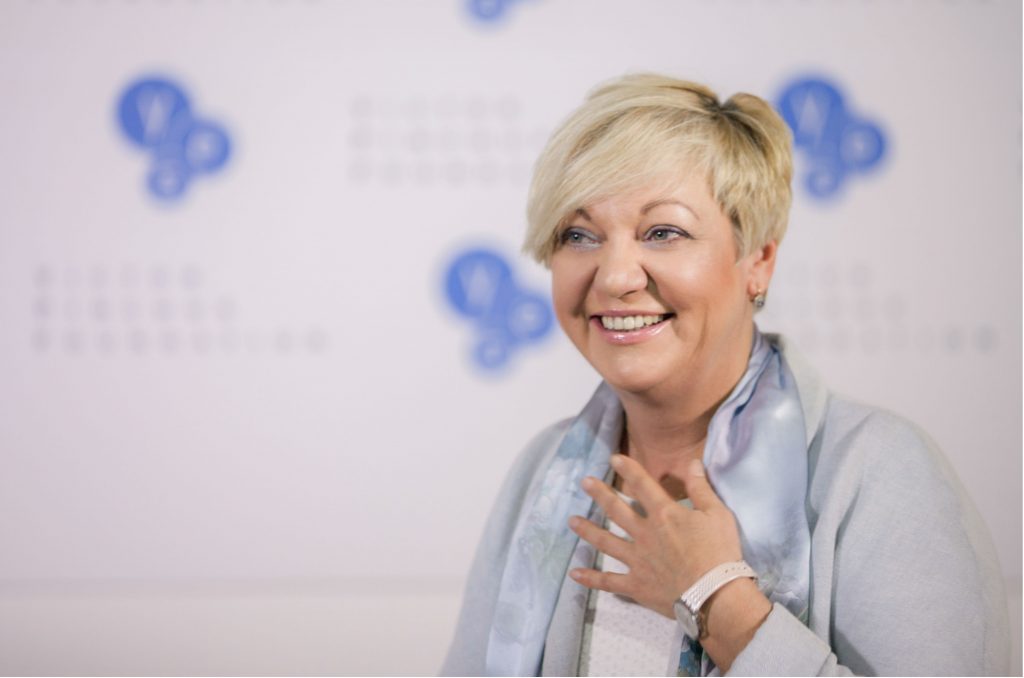 The governor of the National Bank of Ukraine may be diminutive, but she speaks powerfully.
The governor of the National Bank of Ukraine may be diminutive, but she speaks powerfully.
“For the previous two decades we were not brave enough,” Valeria Gontareva, 52, said in a March 8 interview. “The real transition from post-USSR to [a] modern competitive economy did not happen when Ukraine gained its independence.” Instead, Ukraine continued to build on the old Soviet edifice. “The longer you wait, the harder it is to construct the proper basics,” she said.
Gontareva has been hard at work constructing the basics since June 2014.
Through bold, decisive acts, Gontareva shut down more than 80 failing banks and brought inflation down from 61 percent in April 2015 to 8 percent in September 2016.
“She is the greatest hero of Ukraine’s economic reforms, having closed down half of Ukraine’s 180 banks because they were either bankrupt or corrupt or both,” said Anders Åslund, a senior fellow at the Atlantic Council.
The economy is finally starting to recover and banks are beginning to lend again. The country had a good harvest in 2016, trade terms improved, and consumer demand is stronger, fueled by higher wages. The National Bank of Ukraine projects 2.8 percent GDP growth in 2017 and 3 percent in 2018. That said, the economy still has a long way to go to catch up to where it was before the war began in 2014. In one day in March 2014, Ukraine lost 4 percent of its GDP when Russia annexed Crimea, and an additional 17 percent when Russian-backed forces started a war in eastern Ukraine, its industrial base. Russia then eliminated one quarter of Ukraine’s foreign trade through severe trade sanctions.
Populist parties insist that the economy is getting worse, but that is no longer true, though ordinary Ukrainians have seen their bottom line fall substantially since the Revolution of Dignity in 2014.
“It is time to recognize the bitter truth instead of the sweet populists’ slogans, and work hard to make things better,” Gontareva urged.
In December, she made another bold move: nationalizing Ihor Kolomoisky’s PrivatBank. Among ordinary Ukrainians, it wasn’t a popular choice. They were sick of another oligarch getting bailed out by taxpayers, but the problem was that PrivatBank lent almost all its deposits to its owners. “Nationalization was bold but necessary,” Gontareva said. PrivatBank is large; it holds nearly 18 percent of all of Ukraine’s bank assets, and more than half of all Ukrainian bank transactions occur there. But PrivatBank had experienced systematic problems that posed a threat to its sustainability and Ukraine’s overall financial stability, she said. Its capital shortage grew from $4.9 billion in early 2015 to $5.8 billion by December 1, 2016.
“It was the only solution in order to protect more than 20 million Ukrainians,” she said. That number includes 3.2 million pensioners, 1.6 million vulnerable households, 500,000 students, 500,000 sole proprietors, and 600,000 small and large companies.
Nationalizing PrivatBank was also required as one of the IMF’s conditions. In 2015, the IMF approved a $17.5 billion loan program that Ukraine requires in order to keep its economy afloat.
However, Ukraine didn’t make the grade in the IMF’s third review; it failed to meet eight benchmarks. Corruption remains a major problem, and pension and land reform need to be addressed, the IMF wrote in a statement. Gontareva told reporters that Ukraine could receive four tranches from the IMF in 2017, even though the country has fallen short on meeting IMF conditionality in the past.
She admitted that some of the benchmarks “turned out be challenging for Ukraine to meet,” but “we showed our eagerness to implement the reforms” and Ukraine should receive another tranche by the month’s end.
Gontareva was quick to point out that Ukraine needs IMF funds and that the government “should double its efforts” to implement reforms that were marked as structural benchmarks.
She also urged the government to embrace real judicial reform, which might signal to investors that Ukraine is safe, allowing it to begin to attract foreign direct investment. Real FDI has been close to zero since 2014. Gontareva also believes that 2017 is the year when banks will restore active lending; this will spur economic growth and finally bring some tangible benefits to all Ukrainians.
In late February, a rumor circulated that Gontareva plans to resign in June. “The rumor on my resignation is not groundless,” she said, but no announcement has been made.
In the meantime, we should expect the straight-talking governor to continue pushing for more painful yet necessary—and ultimately successful—reforms.
Melinda Haring is the editor of the UkraineAlert blog at the Atlantic Council. She tweets @melindaharing.
Image: Valeria Gontareva, governor of the National Bank of Ukraine, at the 2016 YES annual meeting in Kyiv. Credit: Julia Berezovska/NBU Press Office
